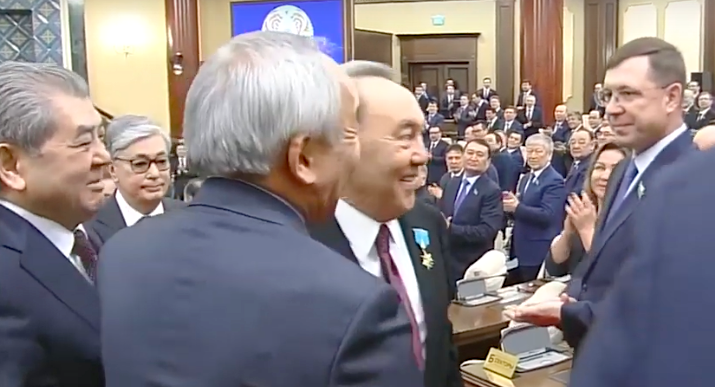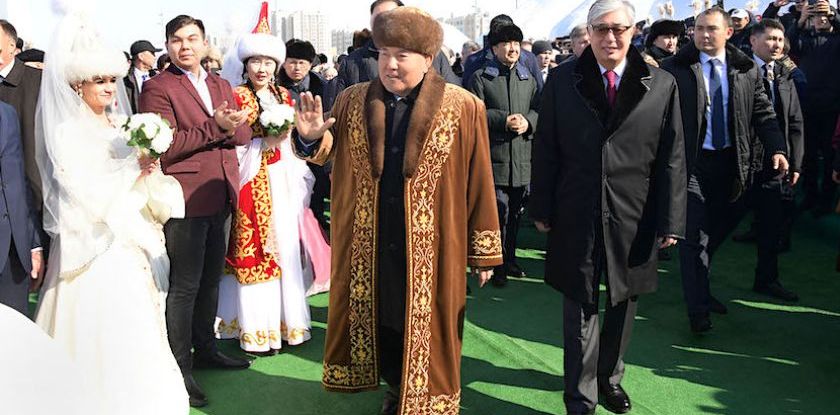The renaming mayhem (including the renaming of the capital into Nur-Sultan as well as the renaming of the central streets of the cities in honor of the Leader of the Nation) has shocked even the Kazakh citizens who are used to pretty much anything. It seems that, after Nursultan Nazarbayev’s resignation and Kasym-Zhomart Tokayev’s ascend to power, Akorda has lost its mind on a massive scale.
However, obviously, this is not the case. Moreover, the authorities’ decisions possess cast-iron logic.
The thing is that the Kazakh authoritarian political system and the super-Presidential vertical have not only been built and led by Nursultan Nazarbayev but, to a large extent, are based on his personal gravitas, the acquired habit that he is always around and the belief that the Tsar can do no wrong, it’s the mandarins that should be accused of the wrongdoing. As a result, Nazarbayev’s resignation, even though it did shake up the system, has not broken it down completely.
However, Nursultan Nazarbayev’s death may turn out to be critical for those close to him today and those who will be named as his heirs both in the domestic policy domain and in the private life.
For instance, the level of the personal weight Kasym-Zhomart Tokayev has in Akorda and the ruling elite can be clearly seen in the video demonstrating how, after the inauguration ceremony, the participants uniformly rushed to Nursultan Nazarbayev in order to shake his hand, say a couple of words, just to get close to him. But no one approached Tokayev to simply congratulate him.

In other words, both the Kazakh authoritarian political system and the super-Presidential vertical function not so much thanks to the force and the violence as the massive passivity of the citizens and their habit to obey the Tsar (Nursultan Nazarbayev). This habit has been inherited from the previous (Soviet and even the pre-revolutionary) times and has been cultivated by the authorities during the past twenty years. Therefore, the renaming of the cities, streets and squares, the construction of the monuments and the other measures aimed to immortalize the Leader of the Nation, to put his on a pedestal, to strengthen the personality cult are needed not so much by Nursultan Nazarbayev himself as by those who will be put in charge after him. They need these measures to have the possibility to refer to the Leader of the Nation and rule in his name as his heirs and followers.
The same kind of process albeit in a smaller scale had taken place in the USSR on several occasions, for instance, after the death of Vladimir Ulyanov-Lenin in 1924.
Such is the logic of the authoritarian (totalitarian) political system.
In light of this, one must understand that the renaming of the capitals, streets and squares in and of itself is not so big of a problem. The history tells us that it is easy to restore the old names and get rid of the monuments, what is needed is the political will or the large-scale initiative on the part of the citizens. It is the preserving of the current political and social situation is what is much more dangerous for Kazakhstan and its future.
We believe the current state of affairs may be characterized as political stagnation. And it is much more critical than stagnation in the economy. Even though the latter does lead to the lowering of the level and the quality of life, it is less destructive than the reducing of the quality of the population itself that stems from the outward flow of the active people capable of leadership.
The only thing that we cannot understand in what is happening right now it why the second President and Akorda are in such a rush. Why are they changing the Constitution in a several hours’ time and making decisions on renaming the capitals and streets? What is behind this rush?
It is possible that Nursultan Nazarbayev’s epoch is soon to end not only on paper?




